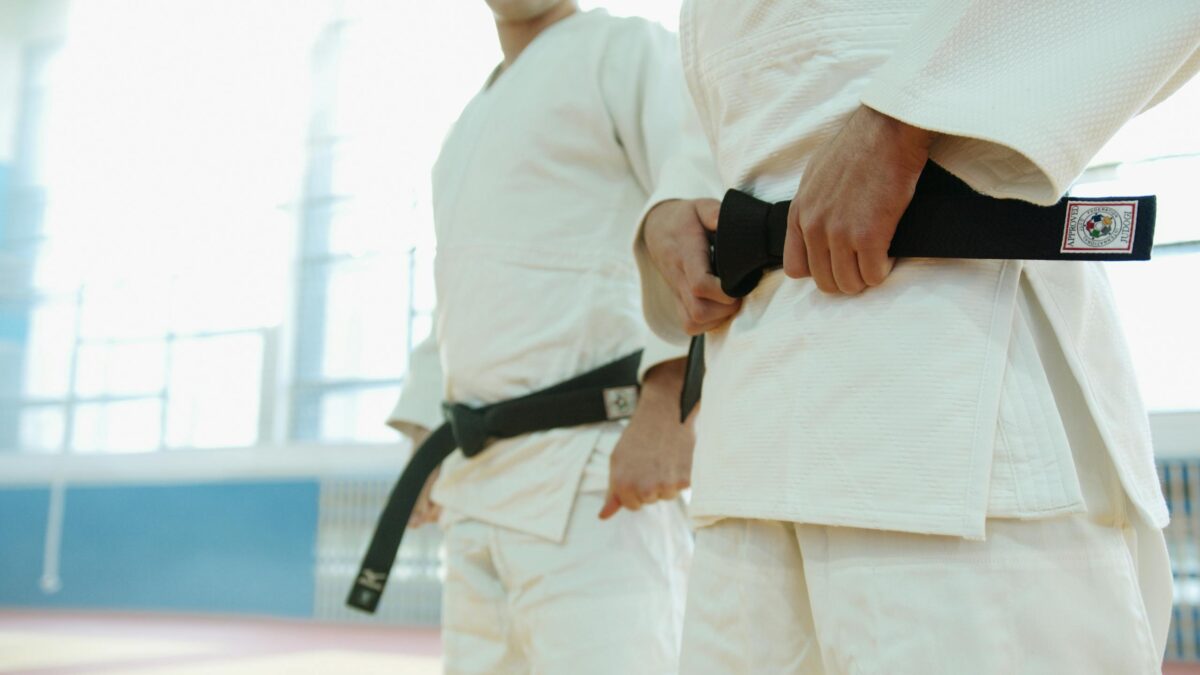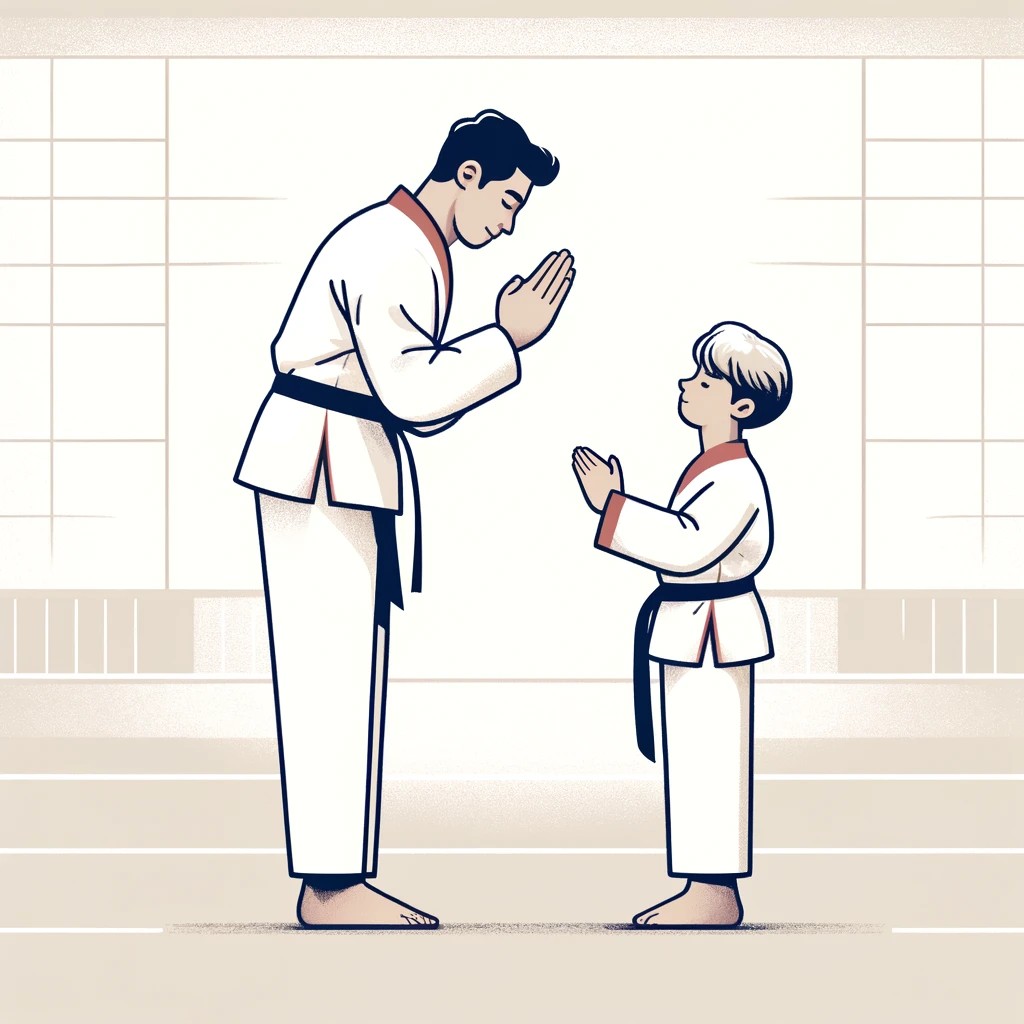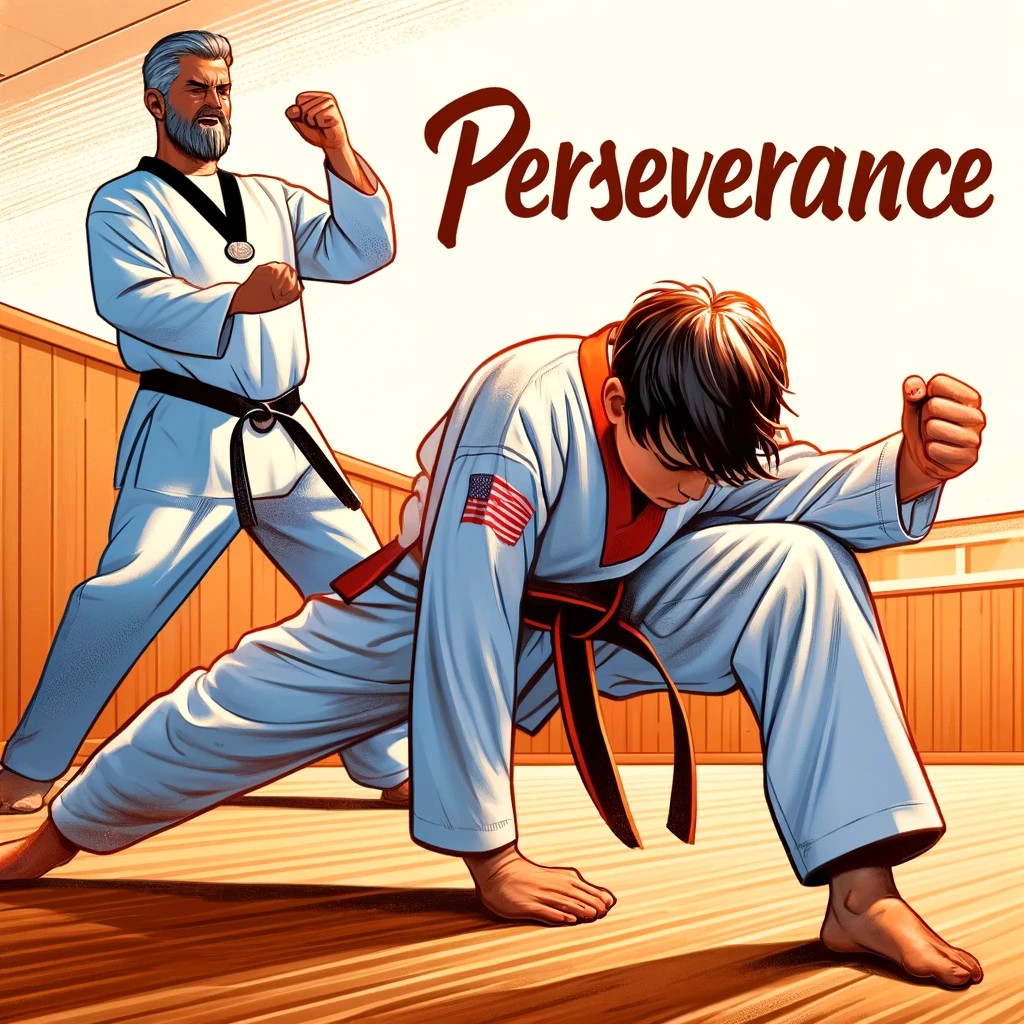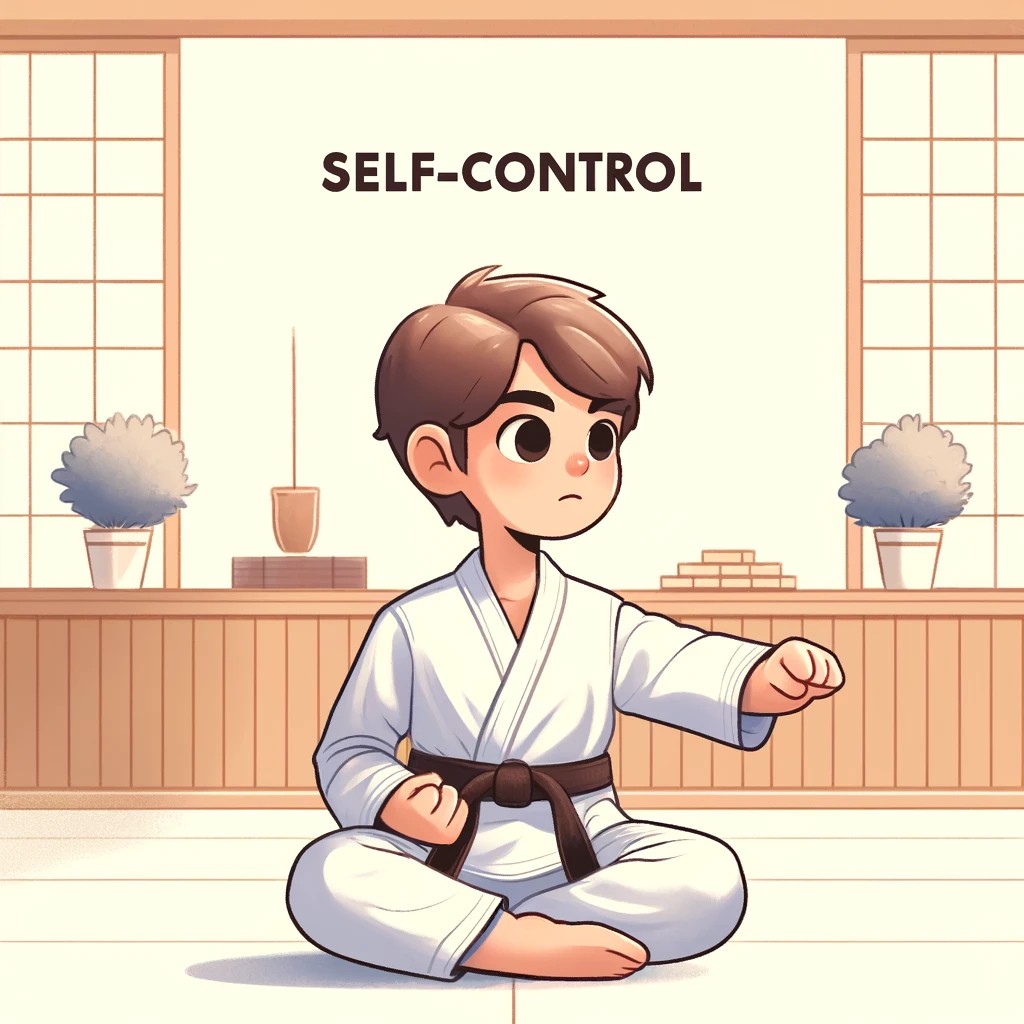5 Tenets of Taekwondo: A Black Belt Perspective!

Have you ever felt something that stretches beyond the physical? I’m talking about a journey that began 25 years ago with Taekwondo but blossomed into something that transformed my entire life. It’s about the core principles that enter into every aspect of your day. Let me share my story and show you how the wisdom of Taekwondo can lead to profound changes, too. And who knows, maybe you’ll even discover a newfound strength and focus that you never knew you had within yourself
| Tenet | Meaning | Everyday Example |
| Courtesy | Politeness and respect for others. | Holding doors open, using respectful language, and being a good listener. Treat everyone with dignity, both in and outside the gym |
| Integrity | Honesty, fairness, and strong moral character. | Telling the truth, admitting mistakes, playing by the rules. Uphold your values and act with fairness in all situations. |
| Perseverance | Determination, resilience, and the will to continue despite challenges. | Finishing a difficult task, overcoming obstacles, and never giving up on goals. Develop a growth mindset and keep pushing forward, even when faced with setbacks. |
| Self-Control | The ability to manage emotions and impulses. | Staying calm under pressure, thinking before reacting, avoiding negativity. Master your emotions and choose how you respond, rather than letting them control you. |
| Indomitable Spirit | Unconquerable spirit, courage, and unwavering will. | Facing fears, overcoming adversity, believing in yourself. Cultivate a “never give up” attitude and approach challenges with confidence. |
Understanding the First Tenet: Courtesy (Ye Ui)

I remember my first time stepping onto the smooth wooden floor of the dojang. Bowing felt awkward, like some kind of ancient ritual I didn’t quite understand. But over time, that simple gesture became so much more. It wasn’t just about respecting tradition, it was about respecting everyone around me –– a core principle of Taekwondo that started to seep into everything I did.
The importance of courtesy in the gym and beyond
It wasn’t just about fancy kicks and punches, you see. It was about learning to hold the door open for someone without even thinking about it, or truly listening to a friend vent, even when I had my own stuff going on. Through Taekwondo, I learned that courtesy wasn’t just for the dojang –– it mattered everywhere. It was about recognizing the dignity in everyone I met, and making even the smallest interaction a chance to connect.
Teaching respect for self and others through Taekwondo
Taekwondo taught me that courtesy goes both ways. It’s not just about being nice to others, it’s also about respecting yourself. It means knowing your limits and being proud of what you’ve accomplished. When you treat yourself with kindness, it sets a standard for how you expect others to treat you, and vice versa.
The Significance of the Second Tenet: Integrity (Yom Chi)

My first big competition was looming, and the butterflies in my stomach were doing a synchronized swimming routine. But the real fight wasn’t going to be with some stranger in a fancy gi – it was with myself. Taekwondo is all about integrity, right? But facing off against a trophy and all that glory… well, let’s just say the voice in my head suggesting a sneaky shortcut was getting awfully loud.
How lack of knowledge and impulse can affect one’s integrity
That’s when it hit me: winning isn’t about the shiny medal at the end. It’s about knowing you fought fair and square, that your victory reflects the hard work you put in, not some cheap trick. Integrity is tough, especially when everyone else seems to be playing a different game. But that’s also what makes it so important. True strength isn’t about throwing the hardest punch, it’s about having the guts to do what’s right, even when it’s hard. That competition was a turning point for me. It taught me that the real champion is the one who walks away with their head held high, knowing they gave it their all the honest way.
This commitment to integrity has become second nature to me. It’s how I approach everything, from competing to dealing with everyday stuff. It’s about treating people with respect, even when they don’t deserve it, and making choices that I can be proud of, no matter what.
The Art of Never Giving Up: Perseverance (In Nae)

Let me tell you, injuries are the worst. One minute you’re flying high, kicking like nobody’s business, and the next you’re sidelined, watching everyone else train. It happened to me, and let me tell you, getting back to the dojang was a battle. My body ached, frustration gnawed at me like a hungry rat, and every step forward felt like wading through mud.
The role of perseverance in overcoming adversity and mastering Taekwondo
But that’s when Taekwondo’s lessons about perseverance really hit home. It wasn’t just about gritting your teeth and bearing pain. It was about using that struggle to fuel your comeback. Every little step, even the ones that felt insignificant, was a victory. It was a sign that I was getting stronger, getting closer to that dojang floor.
That time off the mat taught me a powerful truth: sometimes the biggest leaps come from the toughest times. You learn what you’re truly made of, and you discover a strength you never knew you had. It’s like a seed planted in the dirt – the harder the ground, the stronger the root system, the taller the growth. And that’s exactly what happened to me. My recovery wasn’t just physical, it was mental. It made me tougher, more determined, and ready to take on anything Taekwondo threw my way.
How perseverance in training translates to everyday life challenges
This changed my whole perspective. It wasn’t just about reaching some ultimate goal in Taekwondo, or in life for that matter. It was about the journey itself, the ups and downs, the moments of struggle and triumph. Because let’s be honest, who needs a boring sprint to the finish line when you can have a marathon packed with tiny victories and lessons learned? Sure, it takes longer, but you end up so much stronger in the end.
The Ultimate Test of Strength: Self-Control (Guk Gi)

Let me tell you about a sparring session that turned everything upside down for me. I was going toe-to-toe with this teammate, and let’s just say, my temper was flaring. I wanted to win, badly. And every time I got close, something would go wrong, and I’d just get more and more frustrated. It was a mess.
But then, something clicked. In the heat of the moment, I realized that true self-control wasn’t just about bottling up your anger. It was about being the boss of your emotions, not the other way around. It was about choosing how you react, instead of letting your feelings control you.
The significance of self-control in sparring and self-defense
Learning self-control through Taekwondo has been like finding a superpower. It’s given me a sense of calm and clarity, even when things get crazy. It’s about staying centered and making smart decisions, even when I’m under pressure. And that’s a skill that comes in handy way more than just on the mat. It’s about navigating life with intention and balance, no matter what comes my way. Taekwondo isn’t just about fancy kicks and cool uniforms, it’s about teaching you to be the best version of yourself, on and off the mats.
The Flame That Never Dies: Indomitable Spirit (Baekjool Boolgool)

Life can throw some serious punches, and there were times when I felt like giving up on Taekwondo, something I’d poured years of sweat and focus into. But in those moments of doubt, there was one thing that kept pulling me back: my indomitable spirit. That’s that deep-down courage that refuses to quit, you know?
Taekwondo teaches you this incredible idea – that you have a spirit within you that can’t be broken. It’s not about being some invincible superhero; it’s about knowing that you can face whatever comes your way and keep moving forward. It took me a while, but I realized that giving up wasn’t an option. There’s a fighter within all of us, and that fighter can weather any storm.
How to cultivate an indomitable spirit through Taekwondo training
Learning this in Taekwondo totally changed how I approached life. It’s like a constant reminder that I’m stronger than I think. No matter what challenges life throws at me, I can face them head-on with courage and determination. This indomitable spirit has become my guiding light, pushing me to stand up for what I believe in and keep going, even when things get tough. It’s not about winning every battle, but about fighting the good fight with all my heart. And that’s a victory in itself.
The Journey Is the Reward
Taekwondo isn’t just about fancy kicks and breaking boards. It’s about becoming a better person, inside and out. The more I trained, the more I realized these lessons weren’t confined to the dojang (training hall). They seeped into everything I did. Courtesy, integrity, perseverance – these became my guiding principles, not just for throwing punches, but for navigating life’s challenges.
And let me tell you, Taekwondo has thrown some challenges my way! But it’s also given me the strength and discipline to face them head-on. It’s taught me compassion, for myself and for others. That’s why I want to share these principles with you. Because everyone has the power to transform, not just themselves, but the world around them.
So, as you step onto your own path, remember this: Taekwondo’s lessons are for life, not just for kicking pads. Let them be your guide, your compass. Let them challenge you to be your best self, to live with respect, and to face whatever comes your way with an unbreakable spirit. You might not be training for a black belt, but you’re training for something even more important – becoming the best version of you. And that’s a victory worth fighting for.
Frequently asked Questions
Q: How is self-control practiced within Taekwondo?
A: It’s about being the boss of your emotions, not the other way around. Imagine you’re sparring with a teammate, and let’s be honest, competition can get heated. You want to win, and maybe your opponent just landed a point you didn’t see coming. In that moment, self-control means keeping your cool. It means taking a deep breath and focusing on your technique, instead of letting anger cloud your judgment.
Self-control goes beyond the mat too. It’s about staying calm under pressure, even in everyday situations. Stuck in traffic with a million honking horns? Self-control is that voice in your head telling you to breathe and chill, avoiding a road rage incident that won’t solve anything. It’s about making smart choices, even when you’re tempted to do something impulsive.
Q: Can you give examples where integrity is lacking in martial arts?
A: Integrity is the bedrock of martial arts, kind of like the honor code of being a good teammate. But just like in any sport, sometimes people forget that. Imagine a competition – someone might try to sneak in an extra point during sparring, hoping the ref doesn’t see. Or maybe someone lies about their belt level just to seem tougher. Those are both cheating, and they go against everything martial arts stands for. A true martial artist, like those legendary 300 Spartans who fought valiantly even when outnumbered, would never resort to such tactics. Winning at all costs isn’t the point. It’s about respecting your opponent, respecting the rules, and being honest with yourself and everyone else.
Q: How does the concept of “live and work within one’s capability” apply in Taekwondo?
A: Pushing yourself is a big part of Taekwondo, but you also gotta know your limits. It’s like trying to climb a mountain – you wouldn’t just charge up the face of it, right? You’d take it one step at a time, find a pace that works for you, and maybe even stop to admire the view once in a while. That’s what living within your capability is all about. It means acknowledging where you’re at right now, what your body can handle, and what skills you’ve already mastered. A smart student knows all about gradual progress. They understand that trying to do a fancy flying kick before you’ve even got the basics down could end badly – for you or someone else!
Q: How is the student oath connected to the 5 tenets of Taekwondo?
A: The Taekwondo student oath isn’t just words you say before class. It’s a promise, a handshake with yourself, your instructors, and the spirit of Taekwondo itself. It’s a commitment to be a better person, everywhere you go, not just in the gym. When you take that oath, you’re saying you’ll treat everyone with respect, from your fellow students to the corner store cashier. You’ll stand up for what’s right, even when it’s scary. And you’ll dedicate yourself to being the best martial artist you can be, pushing your limits and learning everything Taekwondo has to offer.
Q: Why is it important for a Taekwondo student to define right and wrong?
A: In Taekwondo, it’s not just about learning cool kicks and self-defense. It’s also about figuring out what’s right and wrong, kind of like building your own moral compass. You see, a Grandmaster is like a wise teacher who leads by example, showing you the importance of honor and treating others well. So, as a student, you start to develop your own sense of justice, that gut feeling that tells you what’s fair and what’s not. This helps you make good choices, both on the mat and off.
Q: What role does a grandmaster play in a student’s understanding of the tenets?
A: A Grandmaster in Taekwondo is like a living legend, a walking encyclopedia of martial arts wisdom. But they’re not just there to show off fancy moves. Their most important role is to teach you the true meaning of Taekwondo – the five tenets: courtesy, integrity, perseverance, self-control, and indomitable spirit. They don’t just tell you about these principles; they show you. They live by them on and off the mat, setting a powerful example. Imagine a Grandmaster who always treats everyone with respect, from the youngest student to the cleaning staff. That’s courtesy in action!
Q: How does perseverance contribute to the perfection of a technique in Taekwondo?
A: Mastering a technique in Taekwondo isn’t like learning a new song on the guitar. It takes more than just memorizing the moves. It takes grit, determination, that never-give-up spirit we call perseverance. Imagine trying to land that perfect roundhouse kick. You might wobble a bit at first, maybe even miss the target completely. But that’s where perseverance comes in. It’s that voice inside you that tells you to keep practicing, to not get discouraged by setbacks. The more you train, the more you refine your movements. It’s like taking a lump of clay and slowly molding it into a beautiful sculpture. With each practice session, your technique gets a little smoother, a little more precise. Perseverance is the key that unlocks that mastery.
